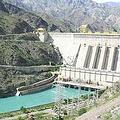 2月上旬,中亞各國領袖參加了一場前蘇聯國家舉辦的高峰會,在該次會議中,俄羅斯展現了積極介入該區域水資源和能源爭議的企圖。區域分析專家對此有不同看法,一方認為莫斯科的介入將讓各國更加緊密合作,另一方則認為將加深各國間既有的嫌隙。
2月上旬,中亞各國領袖參加了一場前蘇聯國家舉辦的高峰會,在該次會議中,俄羅斯展現了積極介入該區域水資源和能源爭議的企圖。區域分析專家對此有不同看法,一方認為莫斯科的介入將讓各國更加緊密合作,另一方則認為將加深各國間既有的嫌隙。
該次會議中,兩大後蘇聯時代的集團──集體安全公約組織(CSTO)和歐亞經濟共同體(EurAsEC)2月4日於莫斯科會面。雖然當時的頭條新聞,刊載了吉爾吉斯總統巴基耶夫(Kurmanbek Bakiev)意外宣佈將關閉境內美軍空軍基地的消息;然而,俄羅斯對中亞水資源與能源爭議該如何處理的立場明顯轉變,才是許多與會者最關心的問題 。
對吉爾吉斯和塔吉克的領導人而言,他們的關注焦點是,德維捷夫1月間訪問烏茲別克時所發表的言論究竟意味著什麼──1月23日,梅德維捷夫與烏茲別克總統卡裡莫夫會面後表示,俄國在吉爾吉斯和塔吉克境內所參與的水力發電廠投資計畫,只有當計畫案考量該區域其他國家的利益時,才會繼續進行。言下之意似乎是,上述會影響到流域內各個國家的計畫,必須取得各國的同意,而不只是直接受益國的同意,且必須堅守環境和其他國際標準。
這項意見與莫斯科當局先前立場有所不同。先前莫斯科片面支持塔吉克和吉爾吉斯的水電廠計畫,無視烏茲別克的反對。烏茲別克害怕在Amu Darya和Syr Darya兩大水道上築水壩,將會威脅其農業部門賴以維持的灌溉用水。
梅德維捷夫明顯轉向令吉爾吉斯和塔吉克領導人感到訝異。1月26日,塔吉克外交部以外交函件對於梅德維捷夫針對水力發電廠投資計畫的發言感到驚訝。
隨後,在2月2日,塔吉克總統拉莫(Imomali Rahmon)突然宣布更強硬的訊息,聲稱他不會參加在莫斯科舉行的兩場高峰會,表面理由是塔吉克經歷了一場嚴重的能源危機。這是多年來與俄羅斯保持密切關係的塔吉克當局,少見的不滿論調。不過,第二天俄羅斯立場轉變,拉莫終究去莫斯科出席會議。
雖然如此,政治分析家說,拉莫最初決定不參加重要地區性會議,只是代表其政府對於俄羅斯為了拉攏烏茲別克而犧牲塔吉克利益的舉動表達不滿。塔吉克認為梅德維捷夫的談話至少違反了莫斯科簽定協議的精神。
 在2004年,俄羅斯總統普丁宣佈俄羅斯公司將參與一筆大交易,完成Rogun和Sangtuda-1發電廠。因為對於水壩規模大小的意見分歧,Rogun計畫宣告失敗。此後塔吉克自行進行基礎建設。不過,在2008年8月,梅德維捷夫仍表示俄羅斯希望仍能參與這項重要工程的部分計畫。
在2004年,俄羅斯總統普丁宣佈俄羅斯公司將參與一筆大交易,完成Rogun和Sangtuda-1發電廠。因為對於水壩規模大小的意見分歧,Rogun計畫宣告失敗。此後塔吉克自行進行基礎建設。不過,在2008年8月,梅德維捷夫仍表示俄羅斯希望仍能參與這項重要工程的部分計畫。
2008年秋天,烏茲別克藉由宣布退出歐亞經濟共同體表達它不滿。這個決定起因於中亞國家在綜合水資源和能源的交易上合作更形緊密。烏茲別克拒絕在該合約上簽字,因為他們偏好與吉爾吉斯和塔吉克討論水資源供給,並在一對一的基礎上向那些國家推銷其天然氣,而非在區域框架內
在此之前,前蘇聯國家為一個單一經濟體制,塔吉克和吉爾吉斯發電廠用於供應整個中亞電力網,並管理共和國下游的水流。另一方面,塔吉克和吉爾吉斯從烏茲別克,哈薩克和俄羅斯處,取得石油、天然氣,和煤。
在後蘇聯時代的經濟秩序下,哈薩克和烏茲別克開始出售其石油天然氣。烏茲別克當局正在控告塔吉克和吉爾吉斯以接近全球天然氣價格收費,因為它認為水是免費天然的商品,並且抱怨它那多山的鄰國在重要的生長季節保留其水資源,只為了裝滿其水庫並避免在冬天缺電。
自塔吉克和吉爾吉斯觀點來看,烏茲別克需了解水就如燃料一般有其價值,該政府應該在財務上為該調節系統(如水壩)的維修做出貢獻。
塔吉克戰略研究的中心的拉莫諾夫(Tagay Rahmonov)相信,梅德維捷夫在水力發電爭議上對烏茲別克讓步,是為了確保雙方在中亞天然氣輸送管線計畫的合作,此工程將支援現有的中亞出口。
2008年,土庫曼同意一項擴大現有輸油管並沿著該管線新建一條沿著裡海東岸,向北經由哈薩克到俄羅斯。拉莫諾夫相信烏茲別克已簽字同意,讓其天然氣直接輸送至俄羅斯。
同時,莫斯科也許不會立刻因烏茲別克的天然氣而犧牲其在塔吉克和吉爾吉斯的利益。根據烏茲別克一位分析家指出,真正目的可能是計算出最佳可操作的承諾,莫斯科以此或多或少能拉攏各方人馬。
「與烏茲別克結盟在地緣政治和戰略方面的重要性,將超過俄羅斯在那些缺乏自然資源小國的利益。 然而,克里姆林宮幾乎不願看見吉爾吉斯和塔吉克脫離,並轉向美國和西方世界。」 他說。
其他評論家指出,有其他利益團體正搶進中亞電力市場。美國希望將此區產出的電力輸出至阿富汗和南亞。伊朗正投資位於塔吉克的Sangtuda水壩,其他如歐盟和中國等,也有興趣扮演更重要的角色。
Central Asian leaders gathered for a summit of former Soviet states last week amid signs that Russia was beginning to show a more active interest in their region's water and energy disputes. However, regional analysts were divided over whether Moscow's engagement would help bring the different states closer together, or deepen the existing divisions between them.
When the heads of member states of two post-Soviet blocs, the Collective Security Treaty Organisation and the Eurasian Economic Community, EurAsEC, met in Moscow on February 4, the headline news was Kyrgyz president Kurmanbek Bakiev's surprise announcement that the United States military airbase in his country was to close.
There was, however, another issue occupying the minds of many summit participants - Russia's apparent change of stance on how Central Asian water and energy disputes should be managed. For the leaders of Kyrgyzstan and Tajikistan, one of the key questions being asked behind close doors is what exactly Russian president Dmitry Medvedev meant by remarks he made during a visit to Uzbekistan in January.
Speaking on January 23 after meeting his Uzbek counterpart Islam Karimov, Medvedev said Russian investment in projects to build hydroelectric power stations in Kyrgyzstan and Tajikistan would only go ahead if the schemes took into account the interests of other states in the region.
Such projects involving rivers that cross state borders had to be agreed to by all the countries affected, not just the direct beneficiaries, and needed to adhere to environmental and other international standards.
The Russian leader's comments represented a major departure from Moscow's previous position, which had favored hydroelectric projects in Tajikistan and Kyrgyzstan without seeming to consider objections from Uzbekistan, which fears that damming up rivers that feed the great Amu Darya and Syr Darya waterways will starve it of the irrigation on which its agricultural sector depends.
Medvedev's apparent about-face came as a shock to Kyrgyz and Tajik leaders. On January 26, the Tajik foreign ministry sent a diplomatic note expressing astonishment at what Medvedev had said regarding hydroelectric plant investment.
Then, on February 2, Tajik president Imomali Rahmon sent an even stronger message by suddenly announcing he would not be attending either summit in Moscow. The official reason was that Tajikistan was experiencing a severe energy crisis. This was a major statement of discontent from a government that has maintained strong ties with the Russians over many years.
However, the following day that position was reversed and Rahmon went to the Moscow meetings after all.
Nevertheless, political analysts say Rahmon's initial decision not to attend an important regional meeting showed just how angry his administration was with Moscow for apparently cosying up to the Uzbeks at the expense of his country.
The Tajiks feel Medvedev's remarks violate at least the spirit of agreements signed by Moscow.
In 2004, then president Vladimir Putin announced a major deal under which Russian firms would complete work on the Rogun and Sangtuda-1 power stations. The Rogun deal fell apart because of differences of opinion over the eventual size of the dam, and since then the Tajiks have proceeded with construction work by themselves. Last August, however, Medvedev signaled that Russia was still interested in being part of this major project.
Uzbekistan voiced its discontent with the way things were going by announcing its withdrawal from EurAsEC last autumn. The decision came as the Central Asian states appeared to be closer than ever to a comprehensive deal on water and energy. The Uzbeks refused to sign up to it, as they have always preferred to discuss water supplies from Kyrgyzstan and Tajikistan and sales of their own natural gas to those countries on a one-to-one basis rather than within a regional framework.
Prior to that, the constituent Soviet republics existed within a unitary economic system, so that Tajikistan's and Kyrgyzstan's power stations were designed to supply the entire Central Asian electricity grid and also regulate water flows to the downstream republics. In turn, the Tajiks and Kyrgyz would be supplied with oil, gas and coal from Uzbekistan, Kazakstan and Russia.
In the post-Soviet economic order, the Kazaks and Uzbeks began selling their oil and gas on a commercial basis. Tashkent is now charging the Tajiks and Kyrgyz near world market prices for gas, but it regards water as a free natural commodity and complains when its mountainous neighboring states withhold it in the crucial growing season in order to fill up their reservoirs and avoid running short of electricity in winter.
From the point of view of Tajikistan and Kyrgyzstan, Tashkent needs to recognize that water has a value just like fuel and that it should contribute financially or in kind to the upkeep of regulatory systems such as dams. Tagay Rahmonov of Tajikistan's Centre for Strategic Studies believes Medvedev conceded a point to the Uzbeks on the hydropower dispute in order to secure their cooperation on a gas pipeline project that would supplement the existing Central Asia-Centre export.
Last year, Turkmenistan agreed to a project to expand an existing pipeline and built a new one alongside it leading northwards along the eastern Caspian Sea shore via Kazakstan to Russia. Rahmonov believes the Uzbeks have signed up to an extension of this route allowing their gas to go straight to Russia.
At the same time, Moscow may not be about to sacrifice all its interests in Tajikistan and Kyrgyzstan for the sake of Uzbek gas. According to a Tashkent-based analyst, the real objective may be to figure out the best workable compromise whereby Moscow keeps everyone more or less on side.
"The geopolitical and strategic importance of an alliance with Uzbekistan could outweigh Russia's interests in the smaller countries which are poor in natural resources. But then again, the Kremlin is hardly likely to want to see Kyrgyzstan and Tajikistan peeling away and moving towards the United States and the West," he said.
As other commentators point out, there are other players jostling to get into the Central Asian electricity market. The United States wants to supply power generated in the region to Afghanistan and South Asia. The Iranians are investing in one of the Sangtuda dams in Tajikistan, and others like the European Union and China are interested in playing a greater rule.
This article originally appeared February 4, 2009 in Reporting Central Asia, produced by theInstitute for War and Peace Reporting


